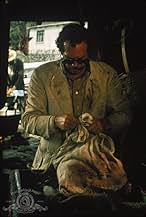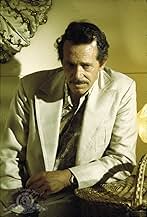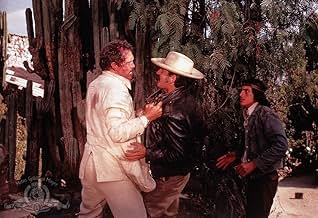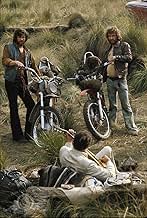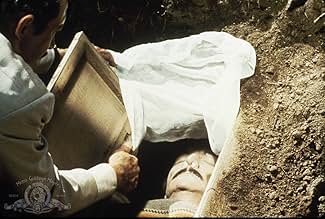Bring mir den Kopf von Alfredo Garcia
Originaltitel: Bring Me the Head of Alfredo Garcia
IMDb-BEWERTUNG
7,4/10
22.601
IHRE BEWERTUNG
Ein amerikanischer Bar-Room-Pianist und seine prostituierte Freundin begeben sich auf eine Reise durch die mexikanische Unterwelt, um ein Kopfgeld auf einen toten Gigolo zu kassieren.Ein amerikanischer Bar-Room-Pianist und seine prostituierte Freundin begeben sich auf eine Reise durch die mexikanische Unterwelt, um ein Kopfgeld auf einen toten Gigolo zu kassieren.Ein amerikanischer Bar-Room-Pianist und seine prostituierte Freundin begeben sich auf eine Reise durch die mexikanische Unterwelt, um ein Kopfgeld auf einen toten Gigolo zu kassieren.
- Auszeichnungen
- 2 Nominierungen insgesamt
Emilio Fernández
- El Jefe
- (as Emilio Fernandez)
Donnie Fritts
- John
- (as Donny Fritts)
Chalo González
- Chalo
- (as Chalo Gonzalez)
Empfohlene Bewertungen
It is my humble opinion that Bring Me the Head of Alfredo Garcia comes as close to capturing the maddening drive of man as any movie. That is to say that it sits at the same table as the greats, perhaps across the way from Citizen Kane or Raging Bull. If you contest this it is perhaps only because the film is not as beautiful, not as magnificent, as the rest of its ballpark. I would argue that that is partially the point.
Bennie's quest is stripped to its core so that the brutality of the film is expressive of Bernie himself. There is not a violent film with more validity for its actions than this one, it is the maddening human mind which causes deaths here. Peckinpah shows us everything that is important in this man's life and then shows us what a man is capable of doing once all that is taken away. The difference between this film and other similar films is perhaps that the movie has such humble beginnings. We build ourselves inside of Bennie. When we first meet him he is casually and happily playing the piano, quietly dreaming of settling into a different kind of love. We share a quiet picnic with him, witness his wedding proposal.
Perhaps also there has never been a chaotic killing spree that has seemed this environmental. While usually the hero goes on a rampage in a way that is appropriately heroic itself, Bennie is no hero. He is a man forced into a situation by the world around him, as it seems he is always forced into situations. Since he is never the man he wants to be it seems natural that he would become the kind of man that is the amalgamation of love and hate.
All the emotion a movie in this genre could handle.
Bennie's quest is stripped to its core so that the brutality of the film is expressive of Bernie himself. There is not a violent film with more validity for its actions than this one, it is the maddening human mind which causes deaths here. Peckinpah shows us everything that is important in this man's life and then shows us what a man is capable of doing once all that is taken away. The difference between this film and other similar films is perhaps that the movie has such humble beginnings. We build ourselves inside of Bennie. When we first meet him he is casually and happily playing the piano, quietly dreaming of settling into a different kind of love. We share a quiet picnic with him, witness his wedding proposal.
Perhaps also there has never been a chaotic killing spree that has seemed this environmental. While usually the hero goes on a rampage in a way that is appropriately heroic itself, Bennie is no hero. He is a man forced into a situation by the world around him, as it seems he is always forced into situations. Since he is never the man he wants to be it seems natural that he would become the kind of man that is the amalgamation of love and hate.
All the emotion a movie in this genre could handle.
Sam Peckinpah's hallucinatory bloodbath was considered career suicide when released in 1974; today, this scuzzy, squirrelly road movie looks less like self-parody than self-autopsy. As such, it has aged better than some of Peckinpah's more "reputable" movies. Like John Cassavetes' THE KILLING OF A CHINESE BOOKIE and Brian DePalma's BLOW OUT, it's a thinly veiled allegory about the muck a filmmaker will wade through to get his movies made. Peckinpah's stand-in is Warren Oates, an actor who always brought a rotgut reek of authenticity to his roles; here, he's a washed-up pianist who stands to score a bundle if he completes one simple task--fetching the severed head of the yutz who impregnated a Mexican warlord's daughter. When Oates isn't defending his not-unwilling girlfriend (Isela Vega) from rapists Kris Kristofferson and Donnie Fritts (!), he's carrying on a boozy, uh, tête-à-tête with the brown-bagged head on an endless drive down Mexico way. But Oates isn't the villain--that distinction is reserved for the effete suits (the slimy duo of Gig Young and Robert Webber) on his tail. Oates is just a guy trying to maintain enough of his integrity to see a dirty job through: He's one of those screw-you Peckinpah heroes who completes his assignment just so he can wage war on his bosses. The movie has such a gritty, oozing, flyblown feel you could swear it was shot on No-Pest Strips instead of celluloid, and as Oates bears down on oblivion it slows to a druggy crawl: Each cut is like a dying man's blink. No matter-in its sick, ornery way, this is one of the director's most personal movies, and worthy of far better than its laughingstock status.
This dark, almost nihilistic film is apparently the only one of Peckinpah's not to be interfered with by a studio or someone of similar standing. The result is exactly what its director intended, a gritty and slow-burning pseudo neo-noir that takes its time getting to the squib-squirting shootouts that Peckinpah is known for. The story is centred around a head: the head of Alfredo Garcia, to be exact. After he impregnates a gang boss' young daughter, the man finds himself on the wrong end of an assassination contract. That's where our protagonist comes in; Oates' dive-bar pianist knows someone who knows where Garcia is, so he sets out to make some quick cash but gets much more than he bargained for. Most of the first half of 'Bring Me The Head Of Alfredo Garcia (1974)' is dedicated to the relationship between the hero and his girlfriend, which is given the time it needs to feel real. It's the underlying heart of the narrative. After a certain point, the picture takes a sharp turn and becomes a lot more bloody. Its final third sees its protagonist try to justify his actions in increasingly dangerous ways, taking violent risks seemingly for no real reason. In the end, though, that's the point: none of it was worth it and any reasoning is futile. It's a bleak conclusion, for sure, but it makes for a stark and distinct experience. Once it gets properly underway, the piece is rather enjoyable in a pulpy sort of sense. It's compelling to see our hero go through his downward spiral and there's this looming feeling of dread that builds as the thing approaches its conclusion. It's a dark flick, but it's often entertaining and is held together by a decent central relationship. 7/10
First, I'm sure everyone commenting on this film has seen the documentary on Peckinpah, and the comments made by the film critics regarding this film. If I may quote one of the critics, and I'm sure you all agree "It's the one film of Peckinpah's that everyone tries to imitate". Even Tarantino does to some degree. I have issues with Quentin Tarantino from a cinematic and artistic point of view, but that is another review. Warren Oates' performance was flawless, as he actually assumes the identity Of Sam Peckinpah as a gesture of appreciation for gracing him with his first starring vehicle.
Warren Oates was taking Sam's journey for him, as Sam looked from behind the lens. This movie was Peckinpah at his best and his worst at the same time. The old Peckinpah themes are there; Mexico is the final frontier, where one can continue to be what he once was in a changing world, but eventually Mexico begins to change as well. As I said in my review of "Junior Bonner" (be sure to check it out, and get back to me)progress is the main antagonist in the lives of Peckinpah's characters.
Junior Bonner and Bennie (Oates' Character) have a common foe, the twentieth century, which is why we find Bennie in Mexico. The chance to improve his situation, and establish a solid relationship with his hooker girlfriend (played with tough sincerity by Isela Vega) arrives at a time in Bennie's life when he least expects it, but it's not as easy as it is set out to be. All he has to do is bring this head to "El Hefe", and at the last minute BAM!! Bennie grows a conscience. Along the way he loses his woman, and then just goes nuts, thus revealing "The Diseased Soul of Sam Peckinpah".
My favorite scene is actually the picnic, where Elita and Bennie discuss their future. Elita begs Bennie to ask her to marry her, he does and she begins to weep. The simple fact that he says it is a tender moment, and shows how the slightest thing can arouse a woman's emotions. Jerry Fielding's musical score, which successfully created the mood and atmosphere for "Straw Dogs" (my all time favorite Peckinpah film) is present, but very muted. Still, this may be the best scene of the film.
Sam Peckinpah finally had complete control to dictate the direction of this film; Free from the money men, and left to his own devices in Mexico where he felt at home. A lot of people say that Pat Garret and Billy the Kid was the last Peckinpah masterpiece, but I think Alfredo Garcia was the last one. It throws you off at the beginning with the horses, then all of a sudden a Corvette screeches by; This is the paradox that really signifies that "The West" is over, bringing Sam Peckinpah and his love for the west full circle.
The critics literally hated this film, but 30 years later because of it we have a Martin Scorcese, a Robert Rodriguez, and a Quentin Tarantino (yeah) to name a few, as well as achieving underground cult status. I'm proud to call "Bring Me the Head of Alfredo Garcia" one of my favorite films.
Warren Oates was taking Sam's journey for him, as Sam looked from behind the lens. This movie was Peckinpah at his best and his worst at the same time. The old Peckinpah themes are there; Mexico is the final frontier, where one can continue to be what he once was in a changing world, but eventually Mexico begins to change as well. As I said in my review of "Junior Bonner" (be sure to check it out, and get back to me)progress is the main antagonist in the lives of Peckinpah's characters.
Junior Bonner and Bennie (Oates' Character) have a common foe, the twentieth century, which is why we find Bennie in Mexico. The chance to improve his situation, and establish a solid relationship with his hooker girlfriend (played with tough sincerity by Isela Vega) arrives at a time in Bennie's life when he least expects it, but it's not as easy as it is set out to be. All he has to do is bring this head to "El Hefe", and at the last minute BAM!! Bennie grows a conscience. Along the way he loses his woman, and then just goes nuts, thus revealing "The Diseased Soul of Sam Peckinpah".
My favorite scene is actually the picnic, where Elita and Bennie discuss their future. Elita begs Bennie to ask her to marry her, he does and she begins to weep. The simple fact that he says it is a tender moment, and shows how the slightest thing can arouse a woman's emotions. Jerry Fielding's musical score, which successfully created the mood and atmosphere for "Straw Dogs" (my all time favorite Peckinpah film) is present, but very muted. Still, this may be the best scene of the film.
Sam Peckinpah finally had complete control to dictate the direction of this film; Free from the money men, and left to his own devices in Mexico where he felt at home. A lot of people say that Pat Garret and Billy the Kid was the last Peckinpah masterpiece, but I think Alfredo Garcia was the last one. It throws you off at the beginning with the horses, then all of a sudden a Corvette screeches by; This is the paradox that really signifies that "The West" is over, bringing Sam Peckinpah and his love for the west full circle.
The critics literally hated this film, but 30 years later because of it we have a Martin Scorcese, a Robert Rodriguez, and a Quentin Tarantino (yeah) to name a few, as well as achieving underground cult status. I'm proud to call "Bring Me the Head of Alfredo Garcia" one of my favorite films.
BRING ME THE HEAD OF ALFREDO GARCIA is Sam Peckinpah's most intimate and underrated film. I can think of few other films of this caliber that are as neglected or unsung.
A bizarre, sleazy film that has Peckinpah's signature trademarks - his romance with John Huston's TREASURE OF THE SIERRA MADRE, loners, Mexico at it's grittiest, slow-motion violence.
When I saw it the first few times, the film seemed to wander aimlessly at various stretches and Peckinpah's direction felt tired to me. Even though Peckinpah can still lift you two inches off the ground with his action sequences, it doesn't have the kinetic impulse running thru it like THE WILD BUNCH, STRAW DOGS, THE GETAWAY or CROSS OF IRON.
Knowing now what I do about his career, I suspect the tiredness was authentic, due to his battles with studio executives and a self- destructive life. This knowledge and the ensuing years of experiencing the picture, have taken on added meaning and enriched it for me. Bennie the down and out piano player, memorably played by Peckinpah's Bogart, Warren Oates, is a wonderful alter ego for the director.
Starring Oates and Isela Vega and a strong supporting cast which includes Gig Young, Robert Webber and Emilio Fernandez. The excellent score is by Peckinpah's best composer, Jerry Fielding.
It may take several viewings but sit back and relish the sad poetry of an authentic film artist, Sam Peckinpah.
A bizarre, sleazy film that has Peckinpah's signature trademarks - his romance with John Huston's TREASURE OF THE SIERRA MADRE, loners, Mexico at it's grittiest, slow-motion violence.
When I saw it the first few times, the film seemed to wander aimlessly at various stretches and Peckinpah's direction felt tired to me. Even though Peckinpah can still lift you two inches off the ground with his action sequences, it doesn't have the kinetic impulse running thru it like THE WILD BUNCH, STRAW DOGS, THE GETAWAY or CROSS OF IRON.
Knowing now what I do about his career, I suspect the tiredness was authentic, due to his battles with studio executives and a self- destructive life. This knowledge and the ensuing years of experiencing the picture, have taken on added meaning and enriched it for me. Bennie the down and out piano player, memorably played by Peckinpah's Bogart, Warren Oates, is a wonderful alter ego for the director.
Starring Oates and Isela Vega and a strong supporting cast which includes Gig Young, Robert Webber and Emilio Fernandez. The excellent score is by Peckinpah's best composer, Jerry Fielding.
It may take several viewings but sit back and relish the sad poetry of an authentic film artist, Sam Peckinpah.
Wusstest du schon
- WissenswertesAccording to Gordon T. Dawson, principal photography was marked with an overwhelming sense of melancholy and defeat, perhaps engendered by Sam Peckinpah's use of cocaine (introduced to him by Oates). The screenwriter (a veteran of several Peckinpah films) was so unnerved by the shift in Peckinpah's mental state and mercurial behavior that he resolved never to work with him again.
- PatzerAs Bennie crosses inside his apartment, alone, and talks to Alfredo's head, a crewman in black clothing is visible, ducking behind an adjacent transom. His arm reappears a second later, as Bennie reaches for a bottle in the pantry.
- Crazy CreditsThere are only three credits at the beginning of the film: The production credit, the two stars, and the story/screenplay. Everything else is at the end, and the film's title is the very last credit.
- VerbindungenFeatured in Sam Peckinpah - Ein harter Knochen (1993)
- SoundtracksBennie's Song
by Isela Vega
Top-Auswahl
Melde dich zum Bewerten an und greife auf die Watchlist für personalisierte Empfehlungen zu.
- How long is Bring Me the Head of Alfredo Garcia?Powered by Alexa
Details
- Erscheinungsdatum
- Herkunftsländer
- Sprachen
- Auch bekannt als
- Tráiganme la cabeza de Alfredo García
- Drehorte
- Produktionsfirmen
- Weitere beteiligte Unternehmen bei IMDbPro anzeigen
Box Office
- Budget
- 1.500.000 $ (geschätzt)
- Weltweiter Bruttoertrag
- 18.894 $
Zu dieser Seite beitragen
Bearbeitung vorschlagen oder fehlenden Inhalt hinzufügen

Oberste Lücke
By what name was Bring mir den Kopf von Alfredo Garcia (1974) officially released in Canada in French?
Antwort


